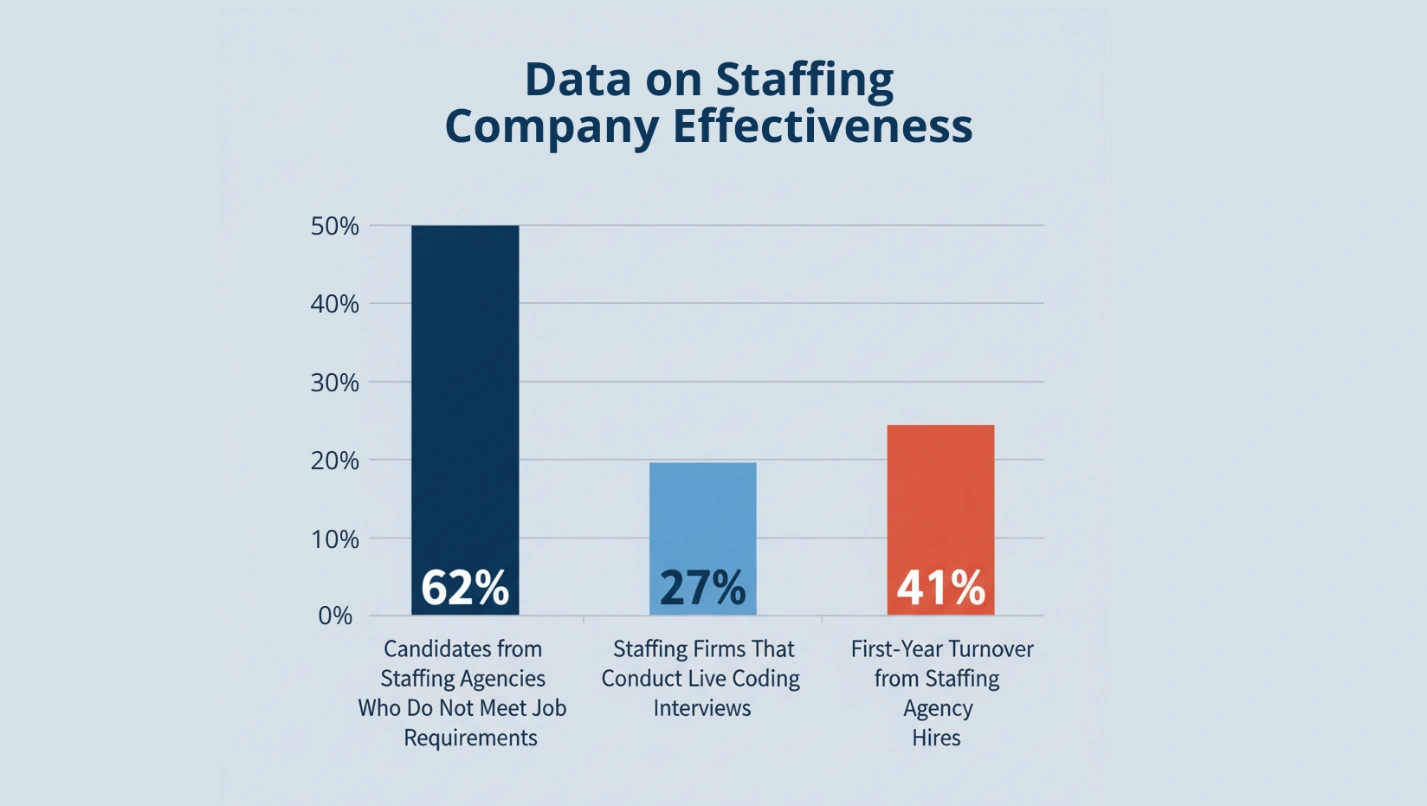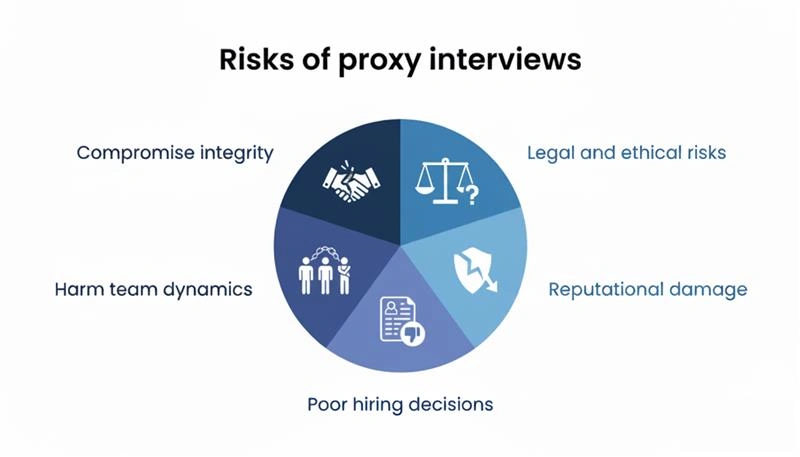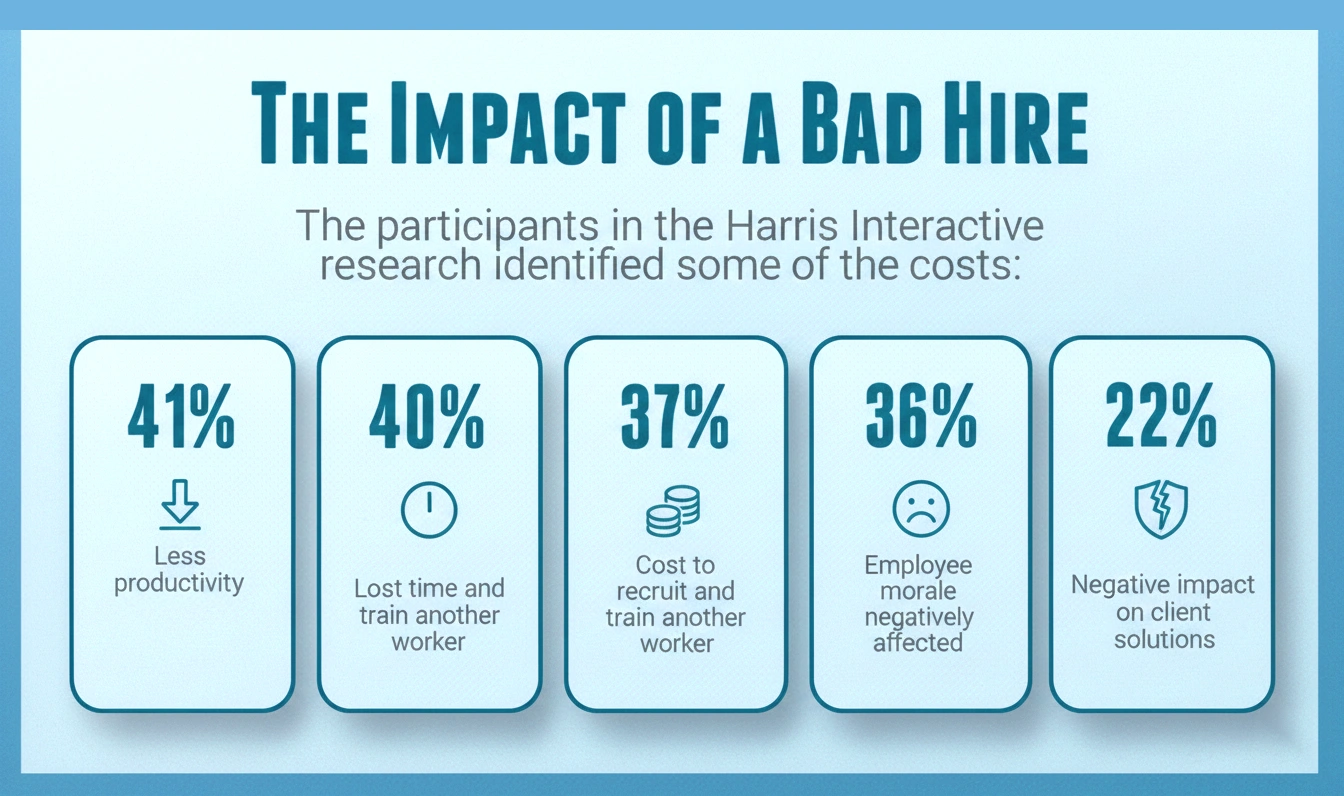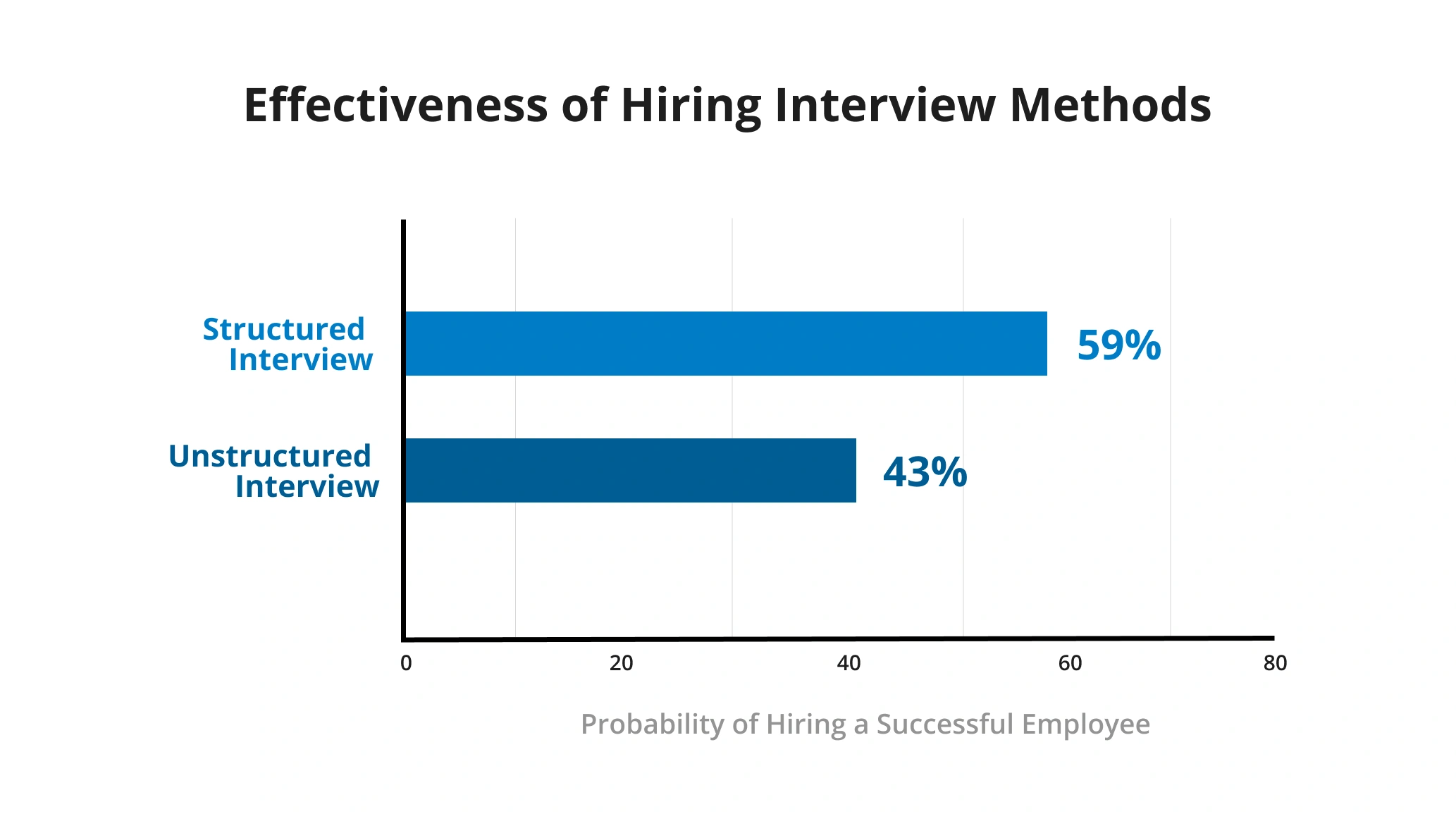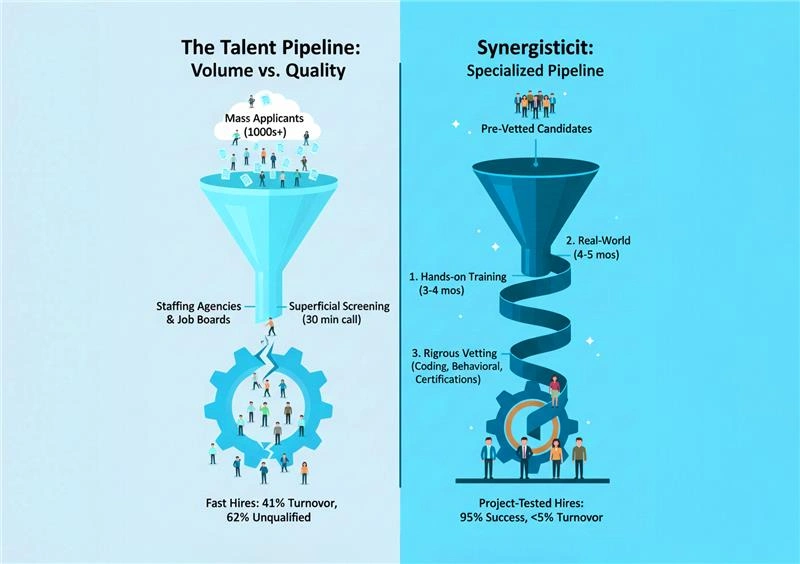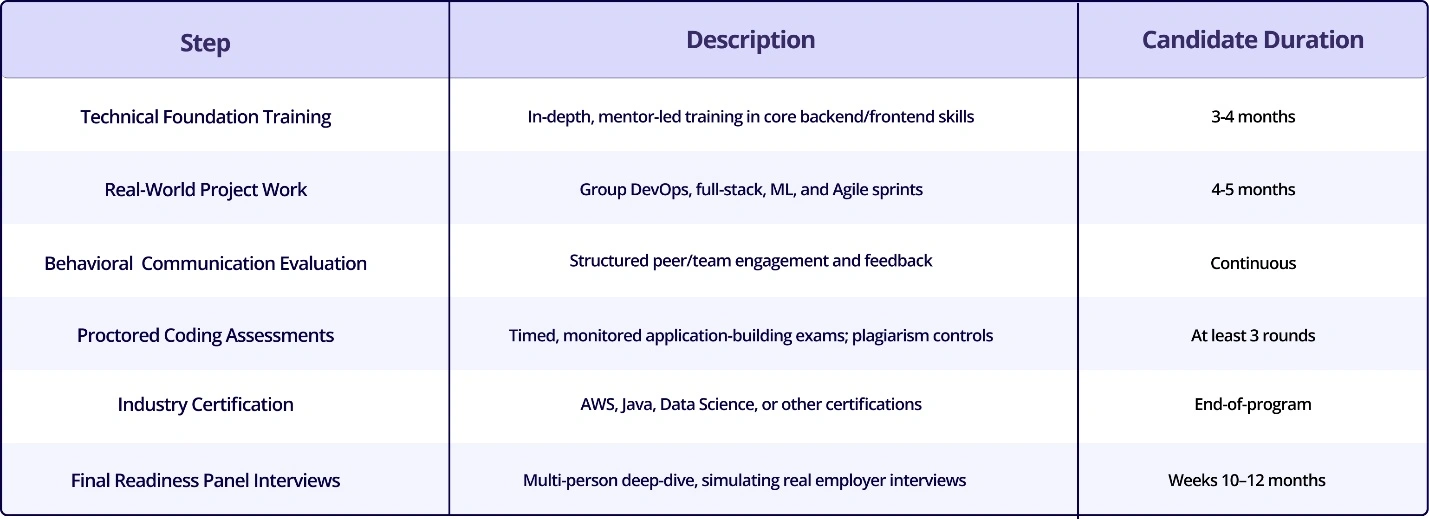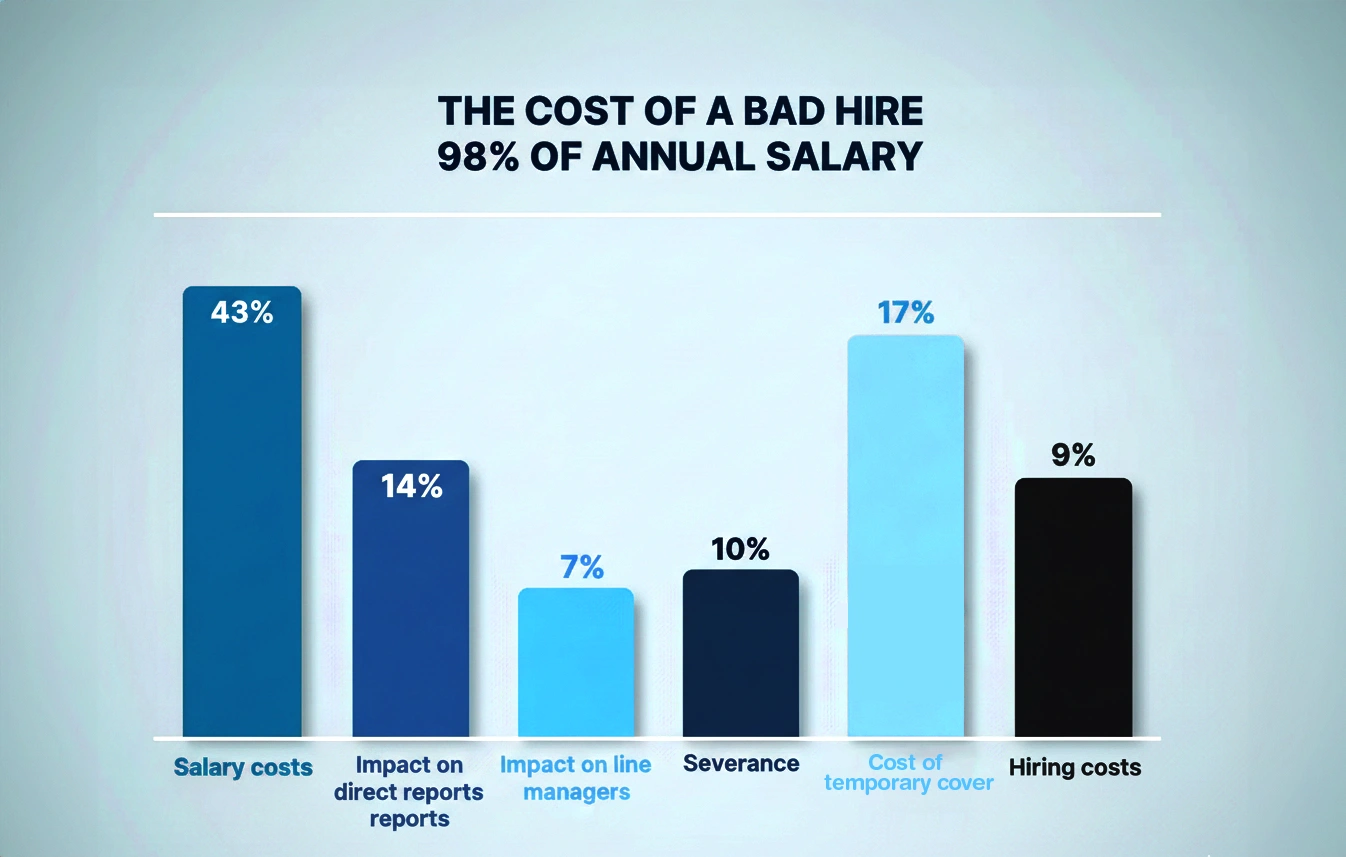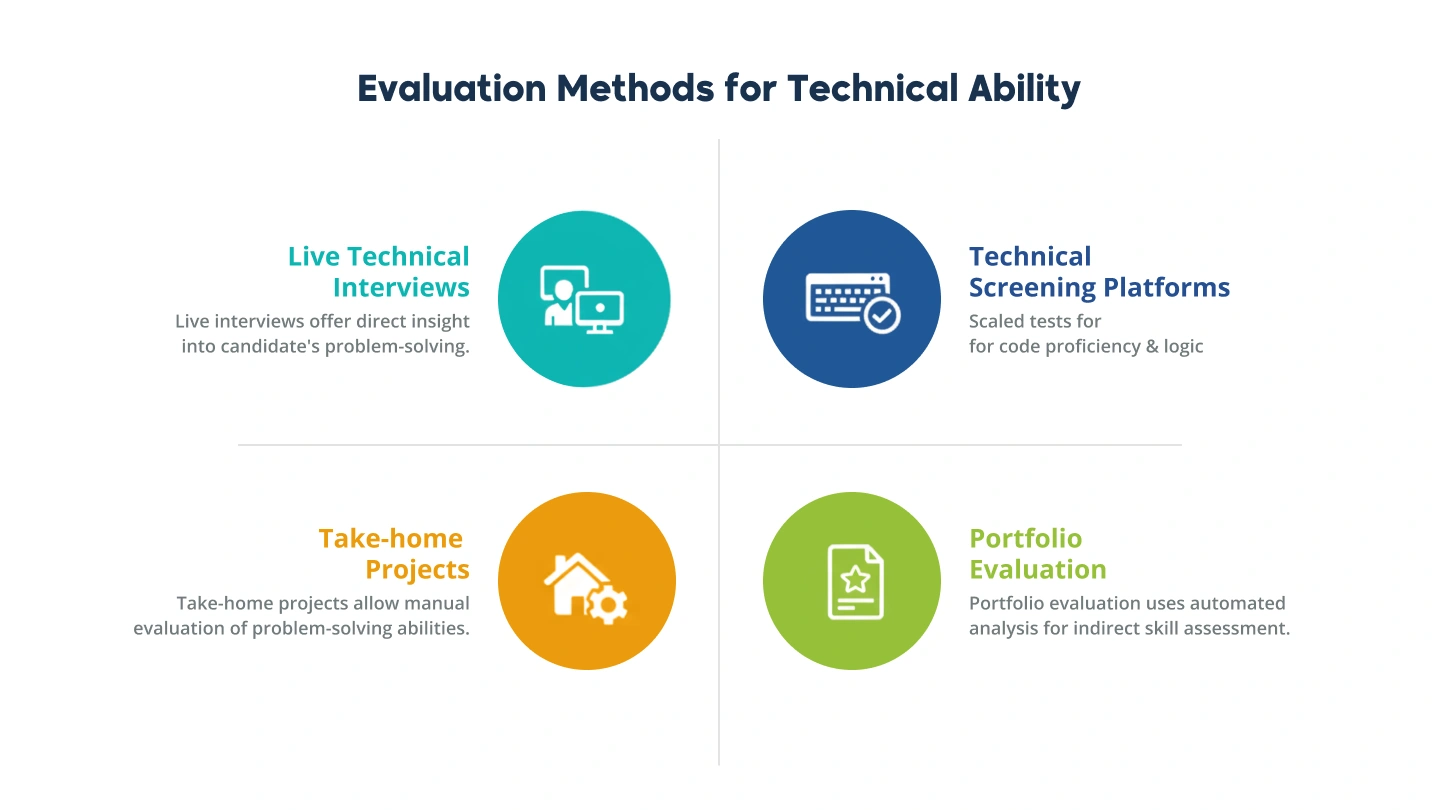The battle for top-tier tech talent remains one of the most pressing challenges facing organizations. From innovative startups to enterprise giants. As the demand for skilled engineers, developers, data scientists, and IT specialists escalates, many tech clients reflexively turn to staffing companies or job boards, hoping these channels will quickly and efficiently deliver the talent needed to drive business growth. However, mounting evidence reveals a stubborn and costly truth: traditional staffing firms and job boards routinely fail to provide the value, rigor, and candidate quality that modern tech organizations require. read on to find out Why startups and Tech companies Should Avoid Staffing Companies and Job Boards

Staffing agencies, despite their promises, often act as superficial intermediaries—collecting resumes en masse and forwarding them to hiring managers with little to no technical vetting or behavioral assessment. Meanwhile, job boards drown clients in an avalanche of unfiltered applicants, forcing internal HR teams to shoulder the thankless burden of separating wheat from chaff. Add to this the rise of AI-driven cheating and the widespread use of proxy interviewers, and the risks of making a disastrous hire through these channels have never been higher.
The Staffing Company Illusion: Are They Really Adding Value?
Staffing Firms’ Superficial Vetting and the “Resume Passing” Trap
The standard pitch from staffing companies is irresistible on the surface: “We pre-vet, screen, and supply you top tech talent with minimal hassle.” Reality, however, diverges sharply from this script. A 2024 analysis by Forbes Technology Council found that many staffing agencies operate primarily as high-volume resume-pushers. Rather than conducting serious, in-depth technical interviews or project evaluations, these firms frequently rely on keyword matching, simple multiple-choice assessments, or superficial phone screens.
The result? Hiring managers are bombarded with a flood of candidates lacking true technical depth, often requiring clients to repeat the evaluation process internally. According to Grant Wagner Talent, “Staffing agencies too often act as a breakneck conveyor belt, rapidly collecting and forwarding resumes with little more than basic screening to maximize their commission per hire”. This commoditized approach is not only inefficient, but actively dangerous: the churned-out candidates may look strong on paper while lacking the skills for real-world software development.
Data on Staffing Company Effectiveness
A 2025 HRLineup report reveals staggering statistics:
- 62% of tech hiring managers report that candidates from staffing agencies “do not meet job requirements”
- Only 27% of staffing firms conduct live coding interviews or project-based assessments
- 41% of hires through tech staffing agencies turn over within the first year, compared to just 18% of hires through customized, project-based pipelines
These numbers underscore a critical point: most staffing companies fail at deep evaluation for technical and behavioral fit. Their business model is predicated on volume, not on the nuanced assessment integral to tech team success.
Case Examples: When Staffing Agencies Hurt Tech Outcomes
Consider the experience of a SaaS company documented by OwlieJobs: facing urgent delivery deadlines, the company partnered with two staffing agencies, both of which forwarded dozens of candidates based on keyword-matching and the ability to pass quick phone tech screens. After two disastrous sprints—marred by code rollbacks, security oversights, and communication failures—it emerged that none of the hires had built production software at scale prior to joining.
The consequences for the business were stark: missed deliverables, loss of client trust, an eventual project rewrite, and direct revenue loss estimated at over $350,000. This example is not an anomaly but a widespread outcome of shallow evaluation and hasty placements—the hallmark of much of tech staffing today.
The Dark Side of Modern Tech Screening: AI Cheating and Proxy Interviewers
AI-Driven Cheating Tools Undermining Screenings
As if superficial vetting weren’t enough, the application of AI to cheat in remote tech interviews has exploded across the industry. With tools like ChatGPT, AI-powered coding bots, and plugin-enabled browsers, candidates can now effortlessly circumvent standard technical assessments—often in ways undetectable by time-starved recruiters.
A 2025 report by Forbes detailed how AI-powered impostors are increasingly passing coding interviews at top firms—sometimes without ever touching the code themselves. The report quoted a hiring manager: “In one week, we found three candidates clearly using AI to solve questions in real-time while pretending to type”.
Researchers at GraffersID found that as many as 30% of virtual tech interview candidates are suspected of using AI tools to artificially boost their performance, with higher rates among applicants sourced via third parties or job boards. Employers using legacy staffing companies are exposed to this risk due to weak controls and inadequate screening formats.
The Proxy Interview Epidemic
Equally damaging is the rise of proxy interviewing—the practice where a skilled stand-in (sometimes called a “ringer”) completes the technical interview on behalf of the real job applicant. Once hired, the original “candidate” appears on payroll, only to disappoint or silently fail on the job.
BarRaiser reports that proxy interview fraud has tripled since 2022, especially in remote hiring processes mediated by staffing agencies. Their data suggest that:
- Over 12% of remote technical interviews for IT roles exhibited clear signs of proxy activity
- Organizations using outside staffing intermediaries were 2x as likely to suffer from proxy incidents compared to companies using in-house, project-based pipelines.
Proxy fraud is devastating for teams—a bad hire based on a false identity can not only waste resources but also introduce security risks and undo entire product cycles.
How Staffing Companies Enable These Risks
Traditional staffing intermediaries, lacking robust verification and technical rigor, are especially vulnerable here. Limited to short virtual meetings, cursory code screens, or unproctored tests, most agencies are functionally incapable of catching modern cheating tactics, according to security reviews by ClearanceJobs and CNBC.
Leading companies like Google have had to overhaul their virtual interviewing after reports revealed widespread cheating with AI, browser extensions, and voice-based AI “whisperers.” Yet most staffing companies lack the technical sophistication, time, or incentives to detect these behaviors—they simply collect a fee on every “placement,” regardless of the candidate’s true ability.
The Catastrophic Cost of a Bad Tech Hire
Quantifying the Damage: Data and Real-World Impacts
The true cost of a bad hire in technology roles is staggering—far beyond mere recruiting fees or onboarding costs. According to research from Grant Wagner Talent and the Sequoia Connect, the average cost of a single bad tech hire ranges from $250,000 to over $1 million once productivity loss, project rework, team morale impact, and client churn are fully accounted for.
| Type of Cost | Average Value (USD) | Description |
| Direct salary and benefits for bad hire | $80,000 – $150,000 | Salary, benefits, taxes |
| Productivity loss (others covering/rewriting) | $40,000 – $200,000 | Dev team, QA, project manager time lost |
| Delayed/failed project costs | $60,000 – $400,000 | Opportunity, market share, contract losses |
| Team morale drop and turnover impact | $20,000 – $150,000 | Resignation, disengagement of high performers |
| Re-hiring and retraining costs | $10,000 – $60,000 | Recruiting, onboarding, lost time |
Numerous surveys reinforce these findings. A 2025 Playroll report states that:
- 74% of organizations report that bad technical hires caused missed project deadlines
- 36% of companies say just one wrong hire in engineering led to missed revenue targets
- 42% of CTOs have replaced an entire technical project team due to weaknesses exposed after hiring through outside agencies or job boards.
The Domino Effect: How Bad Hires Derail Software Projects
Bad hires do not simply underperform—they can taint entire codebases, introduce subtle bugs, fail critical security checks, and erode team collaboration. In notoriously competitive product cycles, one poorly screened developer can produce cascading failures:
- Faulty algorithms leading to mission-critical outages
- Security vulnerabilities opening the door to breaches and compliance penalties
- Loss of organizational “knowledge velocity,” as skilled engineers waste time cleaning up after weak contributors
A 2024 Bridgeteams study on remote candidate vetting concluded that even a single underqualified developer can delay software delivery by 3-6 months and drive 2-3 top performers to leave in frustration. The message is clear: the ROI of a careful, rigorous hiring process is exponentially higher than any savings from “fast” placements by staffing firms.
High-Profile Examples and Their Lessons
High-profile failures—such as the security breach at a major fintech firm in 2023 blamed on poor code review from a contractor placed by a staffing agency—highlight the systemic nature of the problem. Investigations revealed that the developer in question passed a phone screen via AI coaching but was unable to explain core system internals when the breach was traced back.
SaaS giants, consulting shops, and startups have published similar war stories: the temptation to “fill seats quickly” via agencies backfires spectacularly when candidate vetting is inadequate.
The False Promise of Short Tech Interviews
Why Shallow Assessments Fail in Software Hiring
Reliance on short (30-60 minute) technical interviews—a hallmark of most staffing agency processes—has proven woefully inadequate for real skill evaluation in today’s tech landscape. As software systems and codebases grow complex, many crucial skills (such as architectural thinking, code maintainability, and debugging) cannot be probed meaningfully in just a few questions.
A deep-dive on DesignGurus.io concluded that “a 30-minute technical interview is only sufficient for surface-level screening, not for evaluating true developer competency”. Hiring managers consistently report that candidates who ace quick assessments often flounder when faced with real project challenges, team collaboration, or unfamiliar tools.
Key findings from InterviewQuery and StackExchange:
- Short tech interviews favor “test-takers” over problem-solvers
- Skill in memorized algorithms ≠ ability to deliver production code
- Behavioral and communication weaknesses typically go unnoticed
This “interview compression” is even more dangerous when scaled up by staffing companies, whose incentives are to keep up throughput, not to uncover core strength or value in candidates.
The Evidence Against the “Quick Filter” Approach
A 2025 Forbes Human Resources Council analysis argued that standard candidate assessments—including mass-market coding tests or short interview assignments—frequently “provide a false sense of security while weeding out thoughtful, unconventional, or diverse problem solvers.” The risk is especially acute in tech, where depth, collaborative habits, and code craftsmanship distinguish the best hires.
Synergisticit’s own review of common interview pitfalls, published on their consultant process page, also makes it clear: only prolonged, multi-stage evaluation anchored by real projects can surface candidates with genuine skill and workplace adaptability.
A Broken System: Job Boards and Staffing in the Age of AI-Driven Fraud
Why Job Boards Make Tech Hiring Harder, Not Easier
While job boards offer clients access to massive candidate pools, they also flood hiring teams with unqualified, irrelevant, or outright fraudulent applications. According to HRLineup’s 2025 Recruitment Statistics:
- The typical tech job posting receives over 180 applicants
- Less than 12% meet the minimum stated qualifications
- Screening and contacting just the viable candidates can consume 30-40 work hours per opening.
The “signal-to-noise” ratio is abysmal, forcing tech managers to sink precious resources into repetitive screening and risking the chance that strong but unconventional candidates are lost in the shuffle.
Job Boards and the Cheating Crisis
Remote job boards are a nerve center for the cheating crisis. Multiple reports from 2024-2025 highlight job boards as a leading source of AI-enabled fakers, proxy candidates, and paper-only engineers. CNBC’s reporting found that job-board-sourced applicants were twice as likely to employ AI tools to solve “live” code challenges, and three times as likely to attempt proxy interview schemes.
The bottom line: Job boards and staffing companies open the floodgates to unvetted, inadequately screened, and potentially fraudulent tech candidates, raising the risk and cost of each new hire for tech clients.
Deep Dive: Synergisticit’s Rigorous, High-Value, Humanized Tech Hiring Model
The Synergisticit Difference: Depth, Rigor, and Commitment
Unlike traditional staffing companies and job boards, Synergisticit operates more like a “tech candidate incubator,” investing nearly a year into developing, evaluating, and curating a pool of technically and behaviorally elite candidates.
What sets their model apart?
- Comprehensive upskilling: All candidates undergo intensive, hands-on technical training across core programming languages (Java, Python, JavaScript, AWS, data science, and more).
- Extended project cycles: Candidates complete multiple real-world, collaborative software projects—mirroring the workflows, code review, and agile practices of leading tech companies.
- Repeated, proctored coding assessments: Far beyond multiple-choice questions, these tests require candidates to design, debug, and extend full applications in proctored environments.
- Behavioral and cultural fit evaluations: Using structured interviews and team-based project work, Synergisticit assesses teamwork, communication, and adaptability.
- Industry certifications: Candidates finish the program with AWS, Java, or other certifications, reinforcing readiness.
- Near year-long program length: Unlike “fast-track” tech bootcamps or agency screens, candidates stay in the Synergisticit pipeline for up to 12 months, enabling sustained observation and mentorship.
Visit Synergisticit Job Placement Program:
https://www.synergisticit.com/jobplacementprogram/
Step-by-Step: The Synergisticit Screening and Evaluation Process
Every candidate’s performance is tracked across dozens of criteria: code quality, collaboration, knowledge depth, documentation, adaptability, and feedback improvement. This long-cycle, multidimensional approach nearly eliminates the risk of “fake” or misrepresented hires.
Ironclad Safeguards Against Cheating and Proxy Interviews
Synergisticit’s model directly addresses the two greatest risks in modern tech hiring—cheating and proxies:
- Proctored coding exams, both remote and in-person, monitored by experienced developers
- AI-detection tools applied to screen for external assistance
- Continuous observation in long-haul projects (cheats cannot maintain performance over months)
- Structured peer reviews, making it near impossible for a proxy to substitute secretly
No 30-minute phone screens. No generic multiple-choice tests. Each candidate’s code and communication is scrutinized, challenged, and verified repeatedly before any client interview.
Data-Backed Outcomes: Synergisticit’s ROI Advantage and Candidate Success Stories
Measurable Benefits for Tech Clients
Synergisticit is not just theoretically stronger—it delivers demonstrable, data-verified hiring results for employers:
- 95% of Synergisticit-placed candidates pass client tech panels and remain with their employer past the critical 12-month mark.
- Synergisticit’s client-reported new-hire project success rate is 2x higher than hires sourced from staffing firms.
- Placement turnovers due to technical or behavioral issues are below 5%, sharply lower than the 20-30% turnover industry average from staffing companies.
Tech Client Examples and Testimonials
Startups: An AI analytics startup in San Francisco, after multiple failed staffing agency hires, turned to Synergisticit. Their new data engineer, vetted and project-tested over 10 months, delivered a critical, production-grade analytics pipeline within the first quarter, enabling the startup to secure a major B2B client. “The technical depth and hands-on agility of the candidate was unmatched,” reported the CTO.
Large Enterprises: A Fortune 500 insurance firm, struggling with DevOps pipeline outages due to weak contractors supplied by traditional agencies, engaged Synergisticit. The result: two Synergisticit alumni fully modernized the CI/CD architecture, reducing out-of-hours support incidents by 60% and helping the firm pass a major regulatory audit.
Consulting Clients: A global IT consulting firm noted that “Synergisticit candidates integrate faster, need less remedial upskilling, and prove far more adaptable to changing project scopes than hires from legacy staffing channels.”
Synergisticit in the News: National Recognition and Media Coverage
Synergisticit’s industry leadership has been covered by national media—including a major feature in USA Today highlighting their disruptive approach to sourcing, vetting, and delivering high-caliber tech professionals. The article, “How Synergisticit is Changing How Tech Companies Source Talent,” details the company’s unique, year-long pipeline and project-based selection as a game-changer for clients fatigued by bad staffing outcomes.
Read the USA Today feature:
Synergisticit also shares frequent event videos, mock interviews, and alumni success stories on its YouTube channel:
https://www.youtube.com/@synergisticit
These resources offer a transparent window into their rigorous process and the direct value received by tech employers and candidates alike.
Frequently Asked Questions: Tech Hiring, Cheating, and the Synergisticit Process
Q: Why can’t staffing companies or job boards just copy Synergisticit’s process?
A: The Synergisticit approach requires long-term investment, senior mentoring, and real project-postmortem feedback—none of which fit the transactional, volume-based, and margin-driven models of staffing agencies or job boards. Most intermediaries simply lack both the expertise and the financial incentive to nurture, observe, and deeply test candidates over several months.
Q: Isn’t it faster to just use a staffing agency or job board?
A: The appeal of “quick fill” is illusory; studies show that “fast” hires from weak pipelines often require expensive re-hiring, retraining, or even project reversals. Synergisticit’s process saves time in the long-run by eliminating mismatches, fraud, and costly turnover.
Q: How does Synergisticit screen soft skills and culture fit?
A: All candidates undergo behavioral panels, participate in group projects, and receive targeted communication training. Peer and manager feedback is recorded over months, giving tech clients not just a skills transcript, but a character reference grounded in sustained, real-world collaboration.
Why Startups and Large Tech Companies Should Partner with Synergisticit
The Startups’ Dilemma: Why Quick Hires Hurt Small Teams
Startups, especially in the product MVP and growth phases, are the most vulnerable to the downsides of poor hiring. One wrong engineer or data scientist can derail the delivery roadmap, burn limited runway, and jeopardize future funding. Staffing agencies and job boards, with their focus on rapid fill and little vetting, disproportionately expose startups to mis-hire risks.
Partnering with Synergisticit, startups gain access to project-tested, business-impactful tech talent who have already demonstrated the ability to build, debug, and scale full-stack solutions—as opposed to merely “passing a test.” The comprehensive assessments ensure every candidate is ready to thrive under startup constraints: fast-paced execution, ambiguous requirements, tight deadlines, and evolving product vision.
The Enterprise Edge: Quality, Retention, and Regulatory Assurance
For established tech companies and large enterprises, turnover and compliance risk are key drivers of tech talent headaches. Agencies may fill vacant roles but cannot guarantee sustainability, technical alignment, or documentable skill verification. With supply chains and security auditing under increasing scrutiny (especially in finance, healthcare, and SaaS), trusting a partner like Synergisticit means hiring candidates who are:
- Already certified in relevant technologies (AWS, Java)
- Proven on collaborative, high-stakes, long-term projects
- Trained for both technical excellence and process discipline
Enterprises consistently report smoother onboarding, lower ramp-up time, and better internal team chemistry with Synergisticit candidates.
Best Practices: The Case for Delegating Tech Screening and Hiring to Synergisticit
Eliminate Screening Guesswork; Focus on Innovation
Trying to build an in-house vetting engine for every specialized tech role is a losing battle for most HR or internal TA teams. Keeping up with evolving AI cheating, proxy schemes, and new programming languages requires full-time commitment and domain expertise. Industry literature, including works cited in TechServe Alliance and The Talent Games, recommends partnering with deep-evaluation firms to “reduce false positives and engineer hiring pipelines that actually predict job success”.
Delegating the screening and first-round interviewing process to Synergisticit means:
- Lower recruitment lead time
- Far higher placement quality
- Trusted, validated, job-ready candidates delivered consistently
- Measurable impact on team performance and project outcomes
Tech leaders can finally re-allocate internal resources away from screening overload to building products and scaling teams.
Conclusion: Make Tech Hiring Efficient, Effective, and Future-Proof—Choose Synergisticit
The Evidence Is Overwhelming
Staffing companies and job boards are outdated, inefficient, and unsafe channels for sourcing tech talent in 2025. Their superficial vetting, vulnerability to AI-driven cheating and proxy fraud, and failure to produce lasting hires have created a broken hiring landscape. The cost of a bad hire—measured in dollars, time, project risk, and strategic opportunity—makes “fast” or “cheap” placements a dangerous illusion.
Synergisticit’s model is built for the real-world needs of modern tech teams: deep, project-led evaluation; repeated technical and behavioral assessments; and a near year-long observation window. The result: a talent pool that is technically superb, culturally adapted, and ready to drive business impact on day one.
Startups and large tech companies alike can unlock transformative ROI by partnering with Synergisticit. Don’t risk your growth, products, or reputation on weak, under-vetted hires. Delegate your tech screening and hiring to the professionals—leave the noise behind, and reap the rewards of a talent pipeline built on depth, trust, and verified skill.
Want to learn more?
- Synergisticit Job Placement Program
- USA Today feature on Synergisticit
- Synergisticit Event Videos & Alumni Stories
Your next great hire is just a conversation away. Choose Synergisticit. Build with confidence.


